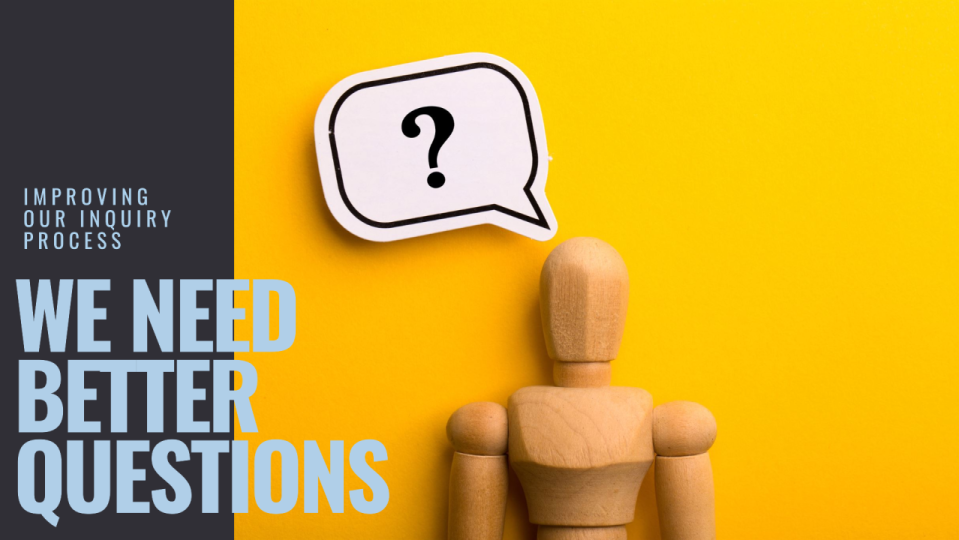
In our ever-relentless pursuit of answers, we often overlook the power of the question itself. As we quickly rush to fill the silence, propose solutions, and climb the mountain of knowledge, neglecting the fertile ground at its base, the field of inquiry. Everything from innovation to problem-solving, and even personal growth all flourish when combined with the right kind of questions. It’s high time that we shift our focus from the “how”, to the more fundamental and meaningful, “why”.
Great questions spark curiosity, challenge assumptions, and open doors to entirely unseen possibilities. But to do so is not easy. It is breaking with the social norms that we have been taught since childhood. Ask any parent, a four-year-old is full of questions but by the time they start school that inquisitive nature has all but died off. We, as a society, have a tendency to be focus on answers and gives little to no time on the question itself. And this is cemented into us from an early age leaving us with serval answers but lacking the questions themselves.
To break these bonds are not easy, yet we must do so as the whole innovative process hinges on these inquisitive embers. When we are faced with a problem, the first instinct is often to start brainstorming solutions. But before diving headfirst into a sea of potential fixes, a good question can change everything. “What if we approached this problem from a different angle?” or “What underlying factors are contributing to this issue?”
These questions push us beyond the mere surface and into the root of the matter. They encourage us to consider the context, the constraints, and even the possibility that the problem itself is the wrong question. Here, the focus isn’t on finding the quickest answer, but on unearthing the most insightful one.
Think of some of history’s greatest creators and innovators, people who found the great answers. They all started with a question.
Leonardo da Vinci didn’t just invent the parachute. He observed the falling of dandelion seeds, if the legends are correct, and posed the question “Why do they fall so slowly”. Isaac Newton did not start with a ready answer after being hit in the head by an apple. Instead, he asked, “Why do things fall?” in a way that led to a deeper understanding of gravity and the principles of flight.
Marie Curie didn’t just discover radioactivity, she questioned the very nature of matter itself. A question that continues to shape our understanding of the universe even today. Their genius wasn’t simply in their answers, but in the audacity of their questions.
This same approach applicable far beyond the realm of scientific discovery. The quality of our everyday lives also hinges on the questions we ask ourselves and others. In our careers, a simple “What are the company’s long-term goals?” or “What are my goals in life?” might lead to a more aligned and fulfilling work experience and better understanding of what we really want, and indirectly, how to get them.
In our relationships, a sincere “How can I better support you?” fosters understanding and connection. Even in our personal development, “What are my core values?” or “What brings me joy?” become the guiding lights on our path to self-discovery.
Better questions lead not just to better answers, but to a more nuanced understanding of ourselves and the world around us. They cultivate empathy by prompting us to consider different perspectives. They challenge biases by forcing us to confront the underlying assumptions that color our perception. The right question can bridge divides, spark collaboration, and ultimately, lead to a more just and equitable world.
However, formulating good questions is far from easy. The human mind is wired for efficiency, often seeking the quickest solution rather than the most profound inquiry. Society has thought us to strive for answers and now to focus on the question itself.
We can easily fall into the trap of “yes or no” questions that get us a quick answer but leave little room for exploration. Furthermore, fear of judgment or appearing ignorant can stifle our curiosity and prevent us from asking the truly thought-provoking questions. In my mind, no question is above anyone pay grade.
This is all great but, how do we cultivate a culture of better questions?
Firstly, we need to embrace curiosity. Treat questions not as signs of weakness, but as the starting point for growth. Secondly, we need to actively listen, both to ourselves and others. Pay attention to the assumptions you make and challenge them with open-ended inquiries. Finally, create safe spaces for questioning. Encourage dialogue where all questions are welcome, fostering an environment of exploration and learning. We need to embrace the four-year-old in all of us, and work from there onwards.
The journey to better questions starts with a shift in mindset. Let’s move from the comfort of answers, to the fertile ground of inquiry. Embrace the power of “why?” and watch as a new world of possibilities unfolds.

 English | EN
English | EN 